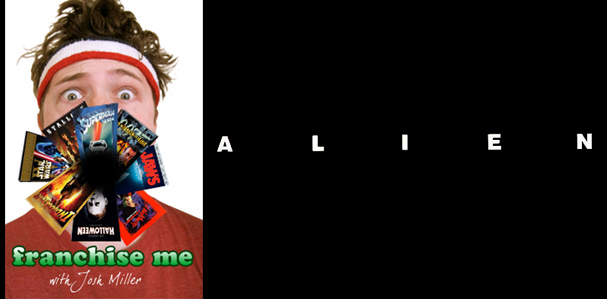
Hollywood loves a good franchise. The movie-going public does too. Horror, action, comedy, sci-fi, western, no genre is safe. And any film, no matter how seemingly stand-alone, conclusive, or inappropriate to sequel, could generate an expansive franchise. They are legion. We are surrounded. But a champion has risen from the rabble to defend us. Me. I have donned my sweats and taken up cinema’s gauntlet. Don’t try this at home. I am a professional.
Let’s be buddies on the Facebookz!
The Franchise: Alien — concerning the expansive universe of a deadly species of creature known as a xenomorph. The creatures have thus far appeared four feature films, as well as two spin-off films, literature, comic books, and video games. For the purposes of this column we will be focusing on the primary Alien franchise – detailing the saga of Ellen Ripley’s involvement with the xenomorphs and the equally nefarious Weylan-Yutani corporation – and 2012’s Prometheus.
previous installments:
Alien
The Installment: Aliens (1986)
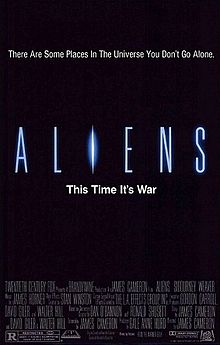
The Story:
We pick up with Ripley where we last saw her, in cryo-sleep aboard her escape pod. When Ripley is discovered and revived she learns that she’s been in stasis for nearly sixty years. She also learns that the Weyland-Yutani Corporation really holds a grudge — Ripley is penalized for destroying the Nostromo. But she is given a chance to reclaim her space-flight license when W-Y representative Burke (Paul Reiser) asks if she’ll accompany a team of marines back to LV-426 (the planet from the first movie) to investigate why the colony living there seems to have disappeared. Ripley accepts, and wouldn’t you know it, it is those pesky xenomorphs again! Mostly all the colonists are dead, mostly, except for one plucky feral child named Newt (Carrie Henn). A bunch of the marines die and Ripley is once again forced to deal with this shit herself. Only now her hair doesn’t look as good as it did in the first film.
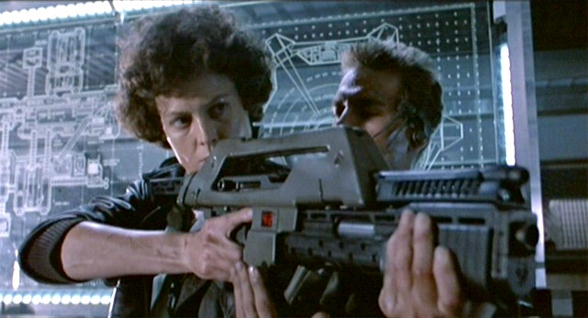
What Works:
Sequels really don’t come better than Aliens. The fact that fans still debate which film is better, Alien or Aliens, clearly demonstrates this fact — especially when you take into account that Alien is easily one of the top five horrors films of all time. The film’s detractors point to the change in tone, to the dilution of the Alien itself, and to the fact that James Cameron shined a light into corners of the mythology that Ridley Scott had left in shadowed mystery. But that’s just an argument for not making a sequel altogether. Who would have wanted a lame repeat of the first film? For things to move forward questions needed to be answered. What Cameron pulls off is extremely impressive, considering the sheer amount of retconning going on, yet none of it detracts or changes anything from Alien. It is a brilliant companion piece.
Yet again the glowing success here is the construction and application of the film’s ideas. Dan O’Bannon is gone, but James Cameron (with help from David Giler and Walter Hill) effortlessly picks up the baton. He doesn’t change or negate anything O’Bannon and Shusett came up with, but merely fills in the gaps and takes things to logical expansion points. The first film never established if the Alien had acid for blood, or if only the facehugger did. But it seems logical that the Alien would too. The Nostromo crew successfully avoided touching the acid blood. So it only makes sense to have some unlucky chumps who do touch it this time around. That sort of thinking represents Cameron’s whole approach — he is amplifying. And he’s not interested in taking things one step further. He cranks this bitch to 11. (That’s going to ruin things for the next sequel, but that’s the next sequel’s problem.) Cameron obviously loved the concepts at play in Alien. And he looked at Alien and asked himself the right questions. A valid critique from detractors has always been that having so many Aliens diminishes their individual importance, rendering the horrifying Alien from the first film personality-less. Which is entirely true. The second half of Alien was a Ten Little Indians-style slasher film. Aliens is a horde film, with the Aliens effectively zombies — complete with our heroes at one point barricading themselves in a single location, Night of the Living Dead-style. But, while this may be a radical structural change from the first film, it is a completely logical extension. In Alien, Kane finds a whole room full of eggs. The only reason there is one Alien is because there was only one of him. If two men had entered the room, we would have had two Aliens. And so on. So to say that the franchise was meant to be about a lone, menacing Alien lurking in the shadows doesn’t really hold water. Whatever laid those eggs clearly wanted tons of Aliens mucking about. And what exactly did lay those eggs? The Alien itself certainly didn’t seem large enough to crap out such a sized thing. So…
The Queen. The Queen is a huge move. She completely changes the game. Again, it is true that turning the Alien into a drone, a member of a hive, drastically diminishes the power of the Alien as an individual foe, but it is a fucking amazing idea to expand the mythology. And it just seems so logical once you’re presented with it. I think part of why the idea fits so snuggly is because Cameron, Giler and Hill had knowledge the audience did not in 1986 — that there was a deleted scene from Alien which showed us that the Alien was merely abducting its prey and cocooning them for… what? I can only presume that it is from this void that the Queen sprung. In fact, much of Aliens seems to be exploring that deleted scene. The bit where the marines scan for the colonists’ tracking-implants, and find they’re all mysteriously crammed together in a single location, is just great set-up. And the discovery of why they’re all crammed in a single location is even better. It is a savvy way to re-use the deleted scene from Alien in a new context. This is also the film that gives us the word “xenomorph,” which fans glommed onto in lieu of anything else to call the Alien other than “Alien.”
We should also address the change in tone. I don’t see this change as a “success” necessarily, but it is a byproduct of the kind of story Cameron was telling. He had different creative goals than Ridley Scott did. Alien was a film. Aliens is a movie. If you follow me. Cameron’s sensibilities could not be more different from Scott’s (at least at the time). He made an action movie full of one-liners, crowd-pleasing moments, and button-pushing plot points. And this is an area in which Cameron is rather unparalleled. Like Spielberg, he is a genius at Hollywood storytelling. There is nothing naturalistic about Aliens. These seem like movie characters saying very movie character things. And being objective, if the film had been bad or merely okay, I would surely be taking Cameron to task for so brazenly stepping away from the aesthetics of Alien — which he does from the get-go, after the movie begins yet again with a slow and quiet moment of our hero in stasis, but now with Cameron suddenly interrupting with the violence and noise of a robotic arm cutting through the door of Ripley’s ship. The tonal change is big, and artistically a step away from artistic. There is also the factor that Alien was a straight-up scary horror movie, whereas Aliens is more of an action-thriller. But Aliens is just too good to deny. It may be different, but it all works so well on its own terms. It also helps that Ripley feels like the same character. She centers things, from a franchise view.
Say what you will about James Cameron, but he gets what a movie can and should be. He wants to entertain, but he wants to do it right. He’s everything Michael Bay is incapable off, because Cameron understands that a movie is about its characters. He has a gift for creating perfect movie characters. And Aliens is a great example of that. We don’t encounter facehuggers until 42 minutes into the film, and we don’t see our first Alien until a full hour in. Before that we just have our characters…
Burke. Burke is such a good character. And Paul Reiser is fantastic in the role. Until you rewatch the film you can forget how likable he initially is. He and Ripley are the odd ducks amongst the marines, and they seem on the same page. Cameron plays us perfectly with Burke too. Burke’s transition from friendly, slightly nerdy side-kick to one of the most hate-able characters in popular cinema is what movies like this are all about. You hate Burke more than any of the Aliens. Which makes Burke’s death one of the most satisfying moments of comeuppance in film history.
Hudson. Oh, Bill Paxton. Will you ever play a role like Hudson again? Of all the movie-like characters in Aliens, Hudson ranks as the most movie-like. And it is sublime. Everything Hudson says is a quotable one-liner, and Paxton’s delivery is applause-worthy — especially once Hudson transforms from wise-ass to panicking coward. “Game over, man,” remains an endlessly applicable movie quote.
Bishop. Forcing Ripley to play with another android is a bit hacky. But making hackwork seem fresh is really what Cameron is all about. His talent is thinking of things that seem obvious after-the-fact. Last time the android was evil. Now he’s good! Sounds obvious, but Bishop feels fresh. You want more of him. Lance Henriksen has never seemed human, so he is a great fit for the part (made more interesting if you know that he was Cameron’s original choice for The Terminator). Bishop is the anti-Burke. He just keeps getting more and more likable. By the end, you likely will cry out “Nooo!” when the Queen rips him in half.
Sergeant Apone. After Hudson, Apone has all the best lines. And Al Matthews chews the scenery even more than his ever-present cigar. Matthews is a delight. As is Jenette Goldstein as Vasquez. Making the biggest badass on the team a chick is a fun move. I especially like that Vasquez isn’t a cliche tough lesbian, and that she actually has the only real romance in the film, with Drake (Mark Rolston). The scene with Drake and Vasquez practicing with their steadycam-esque smart guns is the closest thing to a sex scene in the film.
In Alien Ripley being female was an afterthought. The role was written as a man, and nothing was changed in the script once the decision to make the part female was made. It had some ramifications, yes, but that was entirely on our part and how we viewed the film. Gender-wise, nothing was actually inverted in Alien, because all the roles had been men originally. Aliens on the other hand very intentionally plays with the gender inversion. For one thing, Ripley is now more overtly female, battling with maternal instincts. But bigger than that, Cameron emphasizes the gender swap head on. Hicks (Michael Biehn) is in essence the female lead. He may be a manly man, but he services Ripley and then becomes injured, requiring Ripley to protect him. She is the ultimate mother (which of course is mirrored by the other ultimate mother, the Queen).
Aliens is clever set-piece after clever set-piece. I love the way Cameron recycles bits from Alien, but in ways that don’t feel at all recycled. Dallas’ death in Alien, where the other characters are watching he and the Alien’s tracking blips on a scene, was extremely iconic. Cameron never attempts repeating that, but instead takes the tracking blip gimmick and re-applies it for his film. There is the aforementioned scene where the colonists are located, and then that nail-biting scene in which Hudson is tracking the Aliens progress as the creatures descend on our survivors’ barricade – “That can’t be, that’s inside the room.” And Cameron’s use of the marine’s headcams is both ahead of its time, and bravo filmmaking. The choices he makes between what to show third-person, what to show first-person through the headcams, and what to show of Ripley and the others watching the headcames on a monitor, weave great suspense throughout the lengthy and disastrous first battle sequence. At the risk of sounding simple, it is just cool. As is the entire build up to meeting the Queen. Cameron pulls out all the movie stops. We have the silly macguffin that the colony’s nuclear power reactor is going to explode, leaving Ripley barely twenty minutes to find and rescue Newt. We have Newt cocooned next to an opening facehugger egg. We have Ripley’s discovery of the nest, and first glimpse of the Queen (which is somewhat mind blowing when you first see her). Ripley’s Mexican stand-off with the Queen always brings a smile to my face, when we can see the intelligence of the Queen, telling the other Aliens to back-off. Then Ripley breaks that semi-truce and torches the place. Then we have a tensely unending series of moments of Ripley trying to get away from the Queen. Then we have a classic, “Everything is fine now” fake-out, when the Queen has stowed away on the rescue ship. And then we have the iconic cargo-loader exosuit battle, which remains one of the most entertaining and satisfying “final boss” showdowns in action movie history.
Apparently a key component to the Alien franchise is deleting scenes that introduce a fairly major plot point. This time around the big omission is the detail that Ripley had an 11-year-old daughter in Alien. Now, decades later, that girl is dead. Ripley of course is crushed. And that makes her fixation with Newt deeper. But… it also makes it a little creepier. While including Ripley’s dead daughter provides undeniable gravitas to the character of Ripley, as far as what Aliens is and what happens in the film, I think removing it may have been a decent idea. If I’m being anal, I don’t believe that Ripley had a child in Alien. We see no pictures, and Ripley never mentions her, even when the crew is talking about what they’re going to do when they return to Earth. That is the kind of retconning I can do without, especially because it makes Ripley’s relationship with Newt a bit sad and less heroic, as it then seems like Ripley is only going to all this trouble because she decided Newt is her new daughter. “I won’t lose two daughters, dammit!” you can almost imagine her screaming. I think removing the daughter also makes Ripley’s decision to return to LV-426 more plausible. The loss of her daughter seems like it would have left her near suicidal. Without that, I can buy that Ripley is more concerned with simply getting her life back. Plus, much of Ripley’s interaction with Newt gives the impression that she’s not used to talking with a little girl. I like that. But if Ripley already raised a little girl it seems odd, as though she just doesn’t have very natural mothering skills.
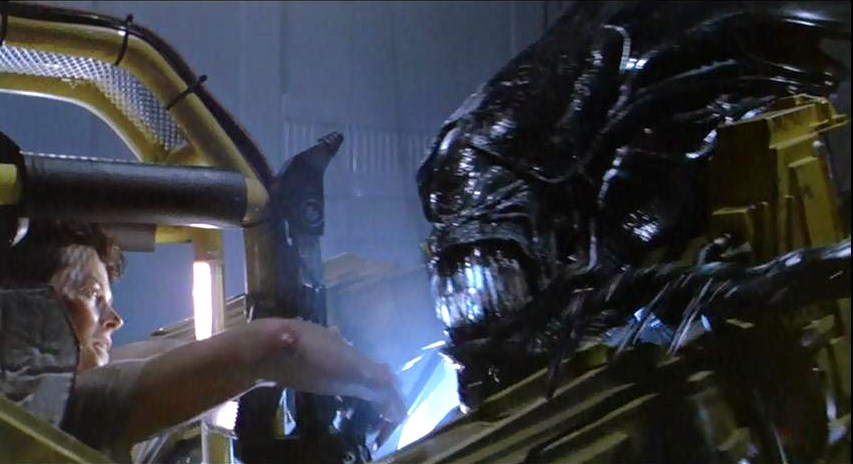
What Doesn’t Work:
Newt. The addition of a little kid to a sequel is almost never good. But here, the idea of Newt works. It’s the execution that leaves something to be desired. I won’t blame Carrie Henn, cause she was just a little kid and not even an actor. But Newt is, well, annoying. The rest of the cast is able to work magic with Cameron’s heightened dialogue, but Henn can’t. So everything Newt says just seems dopey (South Park has forever solidified this, with their mockery of Newt’s line, “They mostly come at night. Mostly.”). But worse than her dialogue is her screaming, or should I say squealing. Newt’s scream always takes me slightly out of the film, as it just doesn’t feel even remotely real. And she screams a lot. I like what Newt does for Ripley, but that’s about it.
By and large I have no problem with the changes Cameron implements, but there are some design tweaks that I did not like — mainly because they seem pointless. Part of Alien‘s effectiveness was how 20th-century everything looked and felt. Aliens feels more futuristic. Granted we never saw what human civilization looked like in the first film, but the space station sets and props we get before Ripley heads back to LV-426 look pretty cheesy, making what already felt more movie-like even more of a movie. Also – and maybe this is just a personal thing – it always bugs me when creatures are redesigned for sequels. I’m all for improving the tech/make-up that brings monsters to life, but actual design changes just become continuity changes for me. If it ain’t broke, as they say. Case in point, Cameron’s decision to get rid of the glossy dome on the Alien’s phallus head. In its place are boney ridges, which look more fittings for the animal, but part of what originally made the Alien so effective was how unnatural it looked, its bio-mechanical elements.
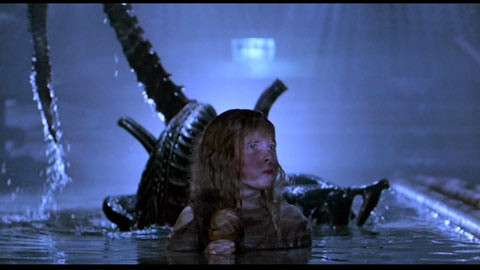
Kills: 13
Best Kill: Burke has the most satisfying kill. But as far as kills we actually witness, I’ll give it to Drake, who fulfills the query from Alien, “What would happen if you got Alien blood on your skin?”
Best Scare: When the cocooned colonist they find attached to the hive wall suddenly opens her eyes.
Best Line: After the disastrous first battle, when Ripley suggests leaving the planet and nuking the whole site.
Burke: Okay, I know this is an emotional moment for all of us. I know that. But let’s not make snap judgments, please. This is clearly an important species we’re dealing with and I don’t think that you or I, or anybody, has the right to arbitrarily exterminate them.
Hudson: Maybe you haven’t been keeping up on current events, but we just got our asses kicked, pal!
How ‘The Corporation’ Fucked Up: Not taking Ripley seriously. If they had, once again, they potentially could have acquired the xenomorph with fewer lost lives. By not believing Ripley, Burke was left to experiment on his own, sending the ill-prepared colonists to investigate, and then formulating a secret plan to essentially surprise the company by returning with an Alien.
Should There Be a Sequel: Yup, keep ’em coming.
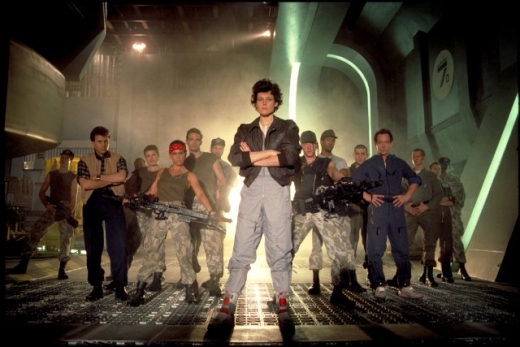
Up Next: Alien 3
previous franchises battled
Critters
Death Wish
Hellraiser
Home Alone
Jurassic Park
Lethal Weapon
Leprechaun
Meatballs
The Muppets
Phantasm
Planet of the Apes
Police Academy
Psycho
Rambo
Tremors